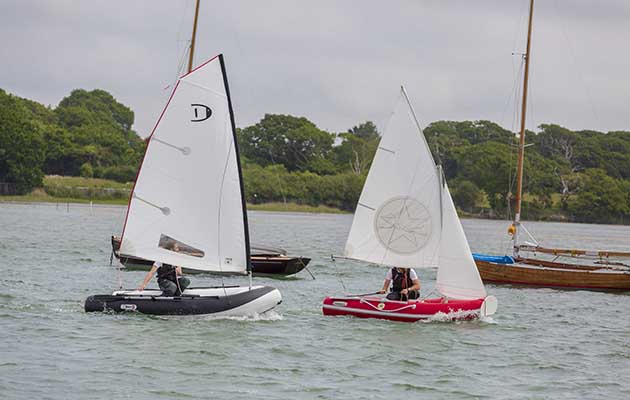We put six portable sailing dinghies under £5,000 to the test to see which one is the best all-rounder and really deserves a place on your boat
Lightweight fabrics and drop-stitch construction enabling rigid high pressure structures are a far cry from the ubiquitous inflatable rubber tender.
For all it’s pack-down convenience, these old-school bulbous craft were never easy to row, and mostly can’t be sailed.
This led to a heavy reliance on outboards, and with it, the loss a peaceful means of exploring new harbours.
With a sail and reasonable rowing abilities, however, you can get around without a noisy engine, occupy family for hours on end, and sail up creeks that a yacht could never explore.

We tested the boats which could double up as portable tenders and capable sailing dinghies
We wanted to try out portable sailing dinghies that offered the best of both worlds – genuinely portable tenders that also double up as capable sailing dinghies.
The Seal, a new product, most closely resembles the once popular Tinker Tramp.
The two Dinghy Go dinghies are the closest to conventional tenders, but with rigid inflatable floors, centreboard casings and stayless rigs.
The Seahopper will delight traditionalists and fans of hard tenders, while folding completely flat.
The two wildcards were the MiniCat Guppy and the Tiwal 2, both of which offer plenty of fun afloat and could double as tenders if needed.
How we tested the portable sailing dinghies
We judged the six dinghies against a few key factors.
First we measured the size of the bags in which the dinghies and all their kit were stowed, and weighed each bag.
This gave us a fair idea of how realistically portable each tender is and how much space it might take up on board.
We then assembled each boat and timed how long it took from packed to ready.

The dinghies were weighed to discover how portable they really were
Whilst assembly will always get quicker with practice, some manufacturers sent representatives for the test, easing our learning process.
Once on the water, both Toby Heppell and Theo Stocker took the sailing dinghies out for a spin, sailing the boats upwind and downwind.
They also rowed and motored those that were equipped to do so (the MiniCat and the Tiwal were not equipped with rowlocks or an outboard bracket).
We measured rough speed via GPS to give us an idea of what speeds could be achieved in the sailing dinghies.
The weather during our test was a little variable with winds between 7-13 knots and minimal wave state.




